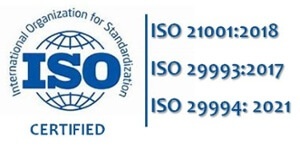Lead Implementer Training is often the better choice.
Why? Because there are two areas of vital interest to the management representative or other person(s) responsible for implementing and maintaining an organization’s quality system outside the scope of Lead Auditor Courses. These are:
Problem 1: The role of the Audit Programme Manager
One of the critical responsibilities of the Management Representative is the Audit Programme Manager, who is responsible for managing the quality system's internal (and external) auditing requirements. The activities here include:
- Introduction
- Process flow – analyzing the organization’s processes and audit history to establish an effective Audit Schedule
- Audit Programme content – both vertical and horizontal audit activities
- Types of Audit Programme – external (suppliers) and as well as internal
- Audit Programme Procedures – allocating responsibility for all six stages of the audit cycle
- Establishing the audit programme
- Training and selecting suitable auditors
- Implementing the audit programme
- Audit programme monitoring
- Taking corrective action where required and ensuring the effectiveness of such corrective actions
- Reviewing and improving audit programmes
These activities are outside the scope of a Lead Auditor Course where the focus is on training auditors to work with Certification Auditors (and ISO Guidance Documents rarely get a mention). Such bodies have their own auditing programmes and procedures (documented and approved as part of their accreditation), so this area is excluded from Lead Auditor Courses.
What about the needs of the Management Representative? Tough!
Click the image to download
Problem 2: Implementing and Maintaining a QMS
Let's focus on ISO 9001:2015.
No two quality management systems are the same, more so now that ISO 9001:2015 doesn’t even include any mandatory documented procedures.
A Quality System's structure, content, implementation, and maintenance to meet ISO 9001:2015 requirements is beyond what a Lead Auditor Course could reasonably expect.
The typical implementation of a QMS is undertaken in three phases:
- Phase A. Initiating (dealing with Parts 4 & 5 of the Standard)
- Phase B. Planning (dealing with Part 6)
- Phase C. Implementation (dealing with Parts 7, 8, 9 & 10)
Maintenance of the system involves a periodic review and audit of the three Phases of the system (incorporated into the mandatory internal audits and the management review activity).
So, what’s the answer? Lead Implementer Courses, of course!
These ISO training Courses are purpose-designed to meet the specific requirements of the Management Representative.
We have developed two such courses with Auditor Certification:
that, in addition to Auditor Training and knowledge of the Standard, also includes Audit Programme Management and the implementation and maintenance of the Management System.
The other Courses...ISO 9001 Consultancy: How to be a QMS Consultant?
- Course 008: ISO 14001 Lead Implementer for Environmental Management Systems
- Course 035: ISO 13485 Lead Implementer for Medical Device Management Systems
- Course 011: ISO 27001 Lead Implementer for Information Securit Management Systems
- Course 038: ISO 45001 Lead Implementer for OH&S Management Systems.
Related Articles
- [Video] When ISO Auditor Training is hard to find
- ISO 9001 Consultancy: How to be a QMS Consultant?
- Free ISO 9001 Implementation Handbook (100+ pages)
- Why training your ISO Internal Auditors is a ‘Must’
deGRANDSON Global is an ISO Certified Educational Organization
We have chosen ISO 21001 certification because, unlike IRCA and Exemplar badges (which, in our opinion, are commercially compromised), it is based on independent third-party assessment. It is a ‘university grade’ standard in use globally by schools, colleges, and universities to demonstrate their competence.

-1-1.jpeg?width=900&height=525&name=Risk%2002%20(16)-1-1.jpeg)


